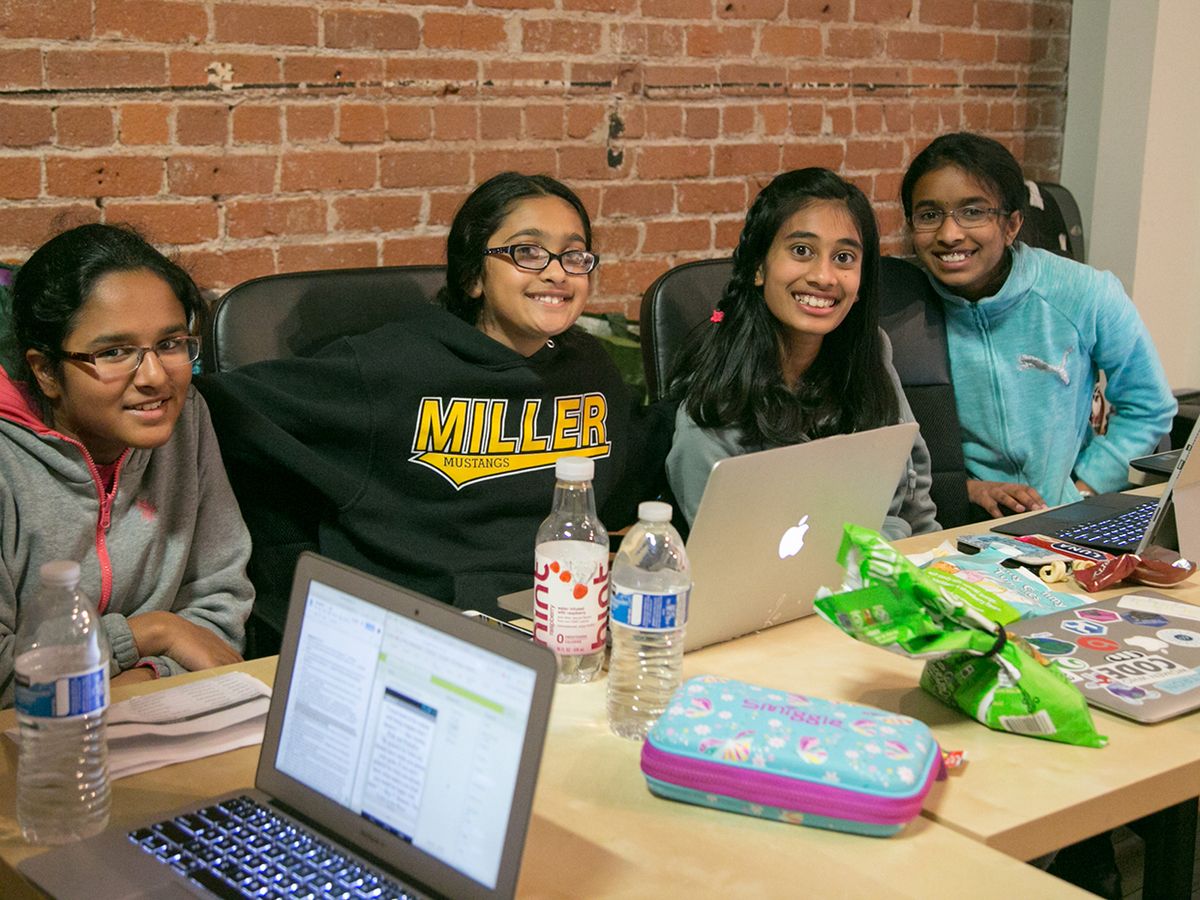“HeartOnSleeve,” “Too Tired to be Tired,” “Moodchanger,” “Food for Less Thought.” If these apps sound like something a teen girl would love, that’s because they were designed by teen girls—and that’s a good thing for the future of women in tech.
These were just a few of the winning apps that came out of last month’s Superposition II, a 24-hour hackathon in San Francisco for middle, high school, and college students who identify as female. It drew 150 hackers along with 39 mentors and 12 judges. The hackers formed 33 project teams—some ahead of time on Facebook, some on the spot.
Areeta Wong, a student from San Mateo High School, started holding these events last year, after attending the Girls Who Code Summer Immersion Program.

Says Wong, “Females shouldn’t shy from a field—like I originally did—because of social norms. Although Girls Who Code had opportunities, they required long-term commitments; I wanted to help females access opportunities quicker and easier, just a weekend of freedom to learn computer science and build a product. I also wanted to show students different fields that could merge with computer science.”
Wong named her effort Superposition, she says, because the term refers to an idea that exists in the world that people have to see to believe. “Lots of people in the tech industry deny the gender gap; I want to be able to show people both that it is real, and to start changing it,” she says.
Outreach coordinator Anelise Cho says Superposition I was her first hackathon. “I've been very interested in computer science most of my high school career and participated in competitions and camps, but never before a hackathon,” Cho says. “Going in, I had a vague idea of what we'd be doing, but soon found it blew past my expectations. The positive and motivated atmosphere, the incredibly helpful mentors, the bond with my new team; overall it was a fantastic experience and I felt glad to have experienced it!”
Cho answered a recruitment ad for the outreach coordinator position after that experience.
These students, I have to say, are unbelievably professional. Cho’s steady but not overbearing push for media coverage rose above the vast majority of public relations emails I receive, and Wong’s concise but thoughtful responses were right on target. And I did not initially know they were high school students—I had assumed they were young engineers already working in the field—until I went to LinkedIn to fact check this post after writing it. The future of women in tech looks like it’s in good hands.
Here’s a roundup of the winning apps:
HoliBot, an app that keeps users posted on obscure holidays, won Best Pitch.
Botlucky, an app that helps people share their food, won Best Use of a .tech Domain. (My son was named biggest mooch in his high school yearbook for his ability to scout out people willing to share their food, so I can confirm that this is an app teens would use.)
Auptics, a gadget that attaches to someone’s ankle and warns of obstacles that could trip them up, won Best Hardware Hack.
VisualEyes, an app that describes the user’s surroundings and reads street signs for the visually impaired, won Best Use of Hasura APIs and Best College Hack.
Reality Check, a game that allows players to test out life choices and face virtual consequences, won Best Game.
Cleffer, an automated translator that can switch music between bass and treble clef, won Best Web App.
Task a Teen, a marketplace for members of a community to hire local teens for chores, won Best Android App.
Position, an app that runs Weiszfeld’s algorithm to help position buildings and key features within them, won Best iOS App.
HeartOnSleeve, wearables that track and display a user’s moods and says whether they’d prefer to be comforted or left alone, won Best Social Good Hack.
La Femme, an app that connects homeless women with donations of feminine products, won Best Female Empowerment Hack.
BrightPath, a tweak on Google Maps that optimizes routes for safety, won Most Creative Hack.
Too Tired to be Tired, an app that sets activity reminders, but adjusts them depending on how exhausted the user already is, won Most Innovative Hack.
FakeBook, an app that uses machine learning to classify news as real or fake, won Best Beginner Hack.
MoodChanger, an app that tackles sadness or boredom with either entertaining or thought-provoking quotes, won Best Middle School Hack.
Food for (Less) Thought, an app that asks a few basic questions and then tells you what to have for breakfast, lunch, or dinner by pulling a recipe from Yummly, won Best High School Hack. (I was really impressed with this one, I’m not sure how deep the database is or how random the selections are, but I do get bored with my own meal ideas, and this came up with some great alternatives.)
Tekla S. Perry is a senior editor at IEEE Spectrum. Based in Palo Alto, Calif., she's been covering the people, companies, and technology that make Silicon Valley a special place for more than 40 years. An IEEE member, she holds a bachelor's degree in journalism from Michigan State University.



